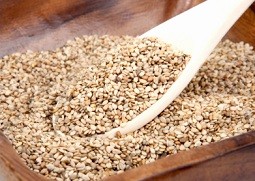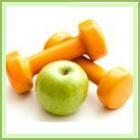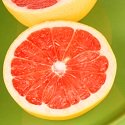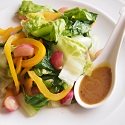Lose Weight
![]() Calories in Food
Calories in Food
![]() Calories in Nuts and Seeds
Calories in Nuts and Seeds
![]() Calories in Sesame Seeds
Calories in Sesame Seeds
Calories in Sesame Seeds and Nutrition Facts
How many calories in sesame seeds? See below, the sesame seed calories for the different serving sizes. We provide you with sesame seed nutrition facts and the health benefits of sesame seeds to help you lose weight and eat a healthy diet.
Grown from the sesame plant, sesame seeds are widely used in cooking, either whole or mashed, or used to make sesame oil. Sesame Seeds are high in both poly and mono unsaturated fats (good fat). They are full of protein, fiber and other nutrients, including calcium, magnesium, copper, phosphorus and potassium. They are also good for vitamin E and thiamine (vitamin B1).
Sesame is good for lowering cholesterol as they contain phytosterols. Sesame seeds also contain sesamin, which is a lignan that acts like an antioxidant which have been shown to be beneficial to lowering blood pressure and cholesterol. With its high copper content, the seeds are thought to provide relief from arthritis. Other sesame seed benefits include good bone health.

The combination of fiber and healthy fat makes seeds a great food for weight loss and weight management. It may surprise you that nuts and seeds are fat burning foods, as they contain a lot of good fat.
Compare calories in sesame seeds with the other calories in nuts and seeds.
Seeds, Sesame Seeds, Whole, Dried
Refuse: 0%Scientific Name: Sesamum indicum
| Serving Size | Calories per Serving |
| 100 grams | 573 kcal (2397 kJ) |
| 1 cup, 144 grams | 825 kcal (3452 kJ) |
| 1 tbsp, 9 grams | 52 kcal (216 kJ) |
Calories in Sesame Seeds, Whole, Roasted and Toasted
Refuse: 0%| Serving Size | Calories per Serving |
| 100 grams | 565 kcal (2364 kJ) |
| 1 oz, 28.35 grams | 160 kcal (670 kJ) |
Oil, Sesame, Salad or Cooking
Refuse: 0%| Serving Size | Calories per Serving |
| 100 grams | 884 kcal (3699 kJ) |
| 1 tbsp, 13.6 grams | 120 kcal (503 kJ) |
| 1 cup, 218 grams | 1927 kcal (8064 kJ) |
| 1 tsp, 4.5 grams | 40 kcal (166 kJ) |
Sesame Seed Nutrition Facts
| Nutritional value per 100 g (3.5 oz) | |
|---|---|
| Proximates: | |
| Water | 4.69 g |
| Energy | 2397 kJ (573 kcal) |
| Protein | 17.73 g |
| Carbohydrates | 23.45 g |
| Sugars | 0.30 g |
| Total Fat: | 49.67 g |
| saturated fat | 6.957 g |
| monounsaturated fat | 18.759 g |
| polyunsaturated fat | 21.773 g |
| Cholesterol | 0 mg |
| Fiber | 11.8 g |
| Minerals: | |
| Calcium, Ca | 975 mg (98 %) |
| Iron, Fe | 14.55 mg (81 %) |
| Magnesium, Mg | 351 mg (88 %) |
| Phosphorus, P | 629 mg (63 %) |
| Potassium, K | 468 mg (10 %) |
| Zinc, Zn | 7.75 mg (52 %) |
| Copper, Cu | 4.082 mg (204 %) |
| Manganese, Mn | 2.460 mg (123 %) |
| Selenium, Se | 34.4 mcg (49 %) |
| Vitamins: | |
| Vitamin C | 0.0 mg (0 %) |
| Thiamine (Vit. B1) | 0.791 mg (53 %) |
| Riboflavin (Vit. B2) | 0.247 mg (15 %) |
| Niacin (Vit. B3) | 4.515 mg (23 %) |
| Pantothenic acid (B5) | 0.050 mg (0.5 %) |
| Vitamin B6 | 0.791 mg (40 %) |
| Folate (Vit. B9) | 97 mcg (24 %) |
| Vitamin B12 | 0.0 mcg (0 %) |
| Vitamin A | 9 IU (0.2 %) |
| Vitamin E | 0.25 mg (1.3 %) |
| Vitamin D | 0 IU (0 %) |
| Vitamin K | 0.0 mcg (0 %) |
| Percentages are relative to US Recommended Daily Intake (RDI) for adults. | |
Author: Lana Soko
You Might Also Like:
Like This Page?
|
Share This Page:
|
Search Our Site:

Free E-Book:
We Recommend:
Looking to get your body into great shape? Get the very best results for your efforts and money! Save your valuable time from surfing the internet. These are theBestselling Weight Loss Programs

Programs that work and have thousands of satisfied customers worldwide!

 |




